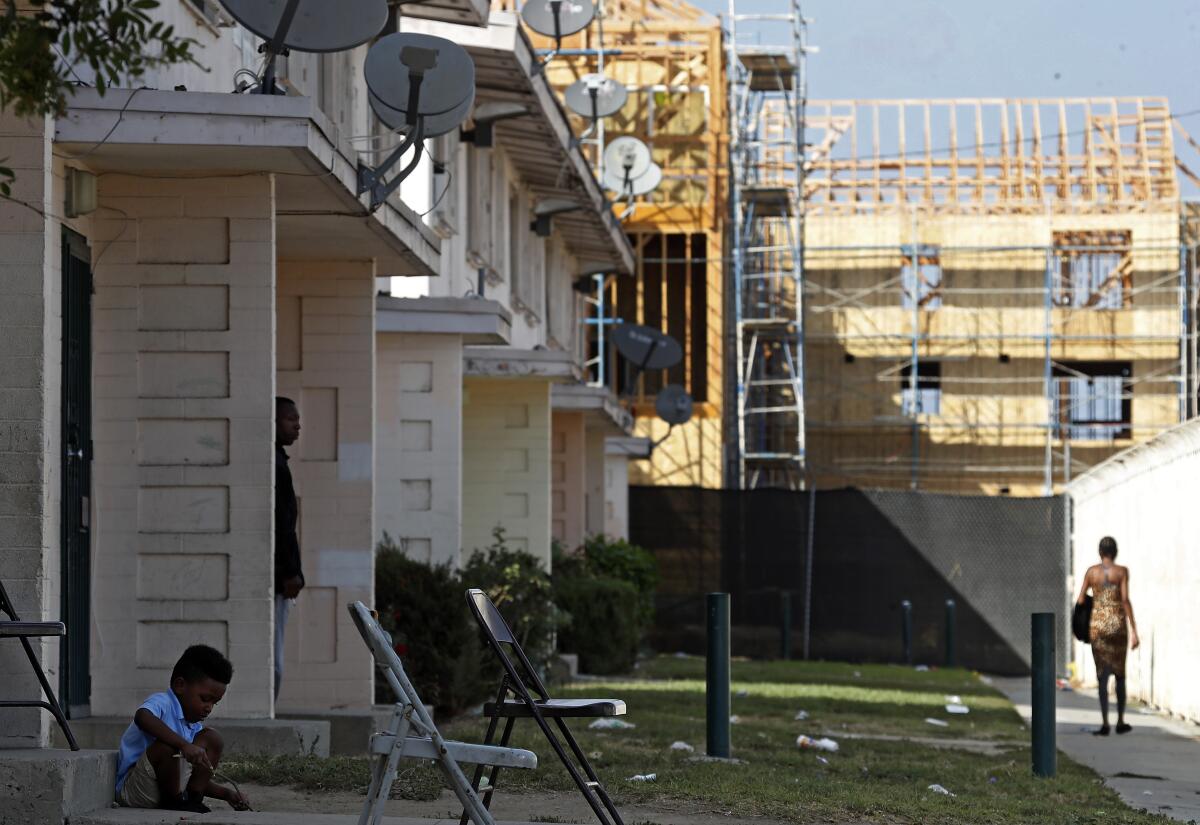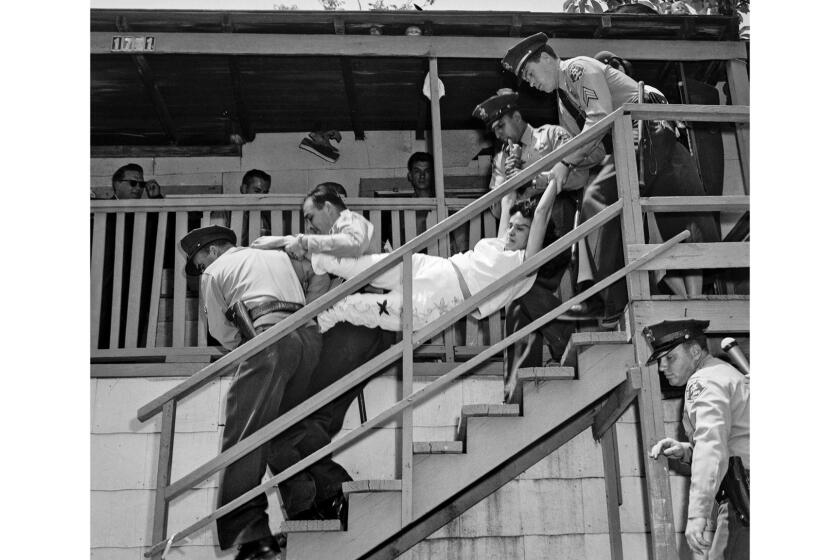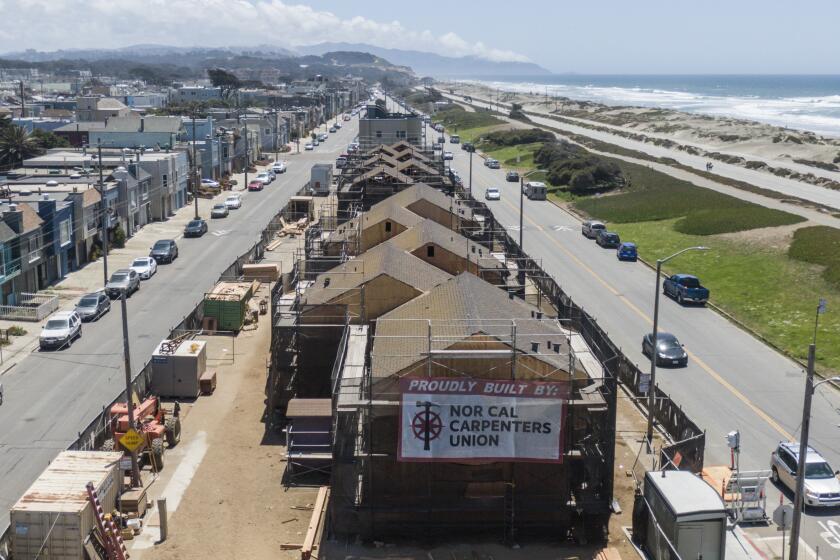California voters to decide on repeal of anti-public housing measure in 2024

- Share via
Nearly 75 years after amending the state Constitution to make it harder to build public housing, California voters will have a chance to repeal the provision on the 2024 ballot.
The measure will ask voters to do away with Article 34 of the California Constitution, which requires voter approval before public housing is built in a community. Article 34, which passed in 1950, stymied low-income housing construction in California for decades and continues today to add to the cost and uncertainty of building affordable housing.
The real estate industry sponsored the 1950 campaign, which appealed to racist fears about integrating neighborhoods and featured heated rhetoric about the need to combat socialism.
Those behind repealing Article 34 argue it’s a racist relic that needs repeal, especially during an affordable housing crisis. While other states have had and repealed laws that called for a public vote before the construction of low-income housing, only California’s Constitution currently requires voter approval for public housing.
“It’s a stain on the constitution,” said state Sen. Ben Allen (D-Santa Monica), who authored the legislation to put the repeal before voters. “It was put in place at a very different time where there were very different attitudes. It’s become a barrier.”
Lawmakers gave final approval to Allen’s measure Wednesday night before adjourning for the year early Thursday.
In 1950, Californians voted to put a provision in the state Constitution that makes it harder for poor people to find a place to live.
Article 34 grew out of a fight over public housing in the northern coastal city of Eureka, where in 1950 the state Supreme Court ruled residents upset with a proposed federally funded public housing development could not use a referendum to stop the project.
In response, the California Real Estate Assn., the forerunner of today’s California Assn. of Realtors, put forward a ballot initiative to amend the Constitution to require a public vote before such housing could be built. The campaign argued that voters should get a say because public housing creates taxpayer debts. The effort also relied heavily on anti-communist and segregationist messaging.
Newspaper ads paid for by the Realtors blamed “minority pressure groups” for pushing public housing. At the time, the Realtors’ Code of Ethics included a provision barring agents from integrating neighborhoods on the basis of “race or nationality” if doing so would be “clearly detrimental to property values.”
The initiative narrowly passed and was a forerunner to one of the most defining events in L.A. history. In 1952, L.A. voters rejected plans for large-scale public housing projects primarily planned in Mexican American neighborhoods known as Chavez Ravine.
Many residents had already been evicted from the area when the housing plans were canceled, and the city eventually gave the land to the Dodgers for a stadium to lure the baseball team from Brooklyn.
Most residents of Chavez Ravine had been relocated in the early 1950s, but a proposed public housing project was scrapped.
Article 34 thwarted public housing development in Los Angeles and across the state, with federal housing officials in the late 1960s blaming the provision for the state’s shortage of affordable housing.
Following the rejection of a public housing proposal in San Jose around the same time, a legal challenge to Article 34 argued that it violated the U.S. Constitution’s Equal Protection Clause by denying poor people access to housing.
The U.S. Supreme Court upheld the provision’s constitutionality in 1971 because it didn’t single out a racial group. Historians have cited the ruling as significant in affirming state and local policies across the country that discriminate against those in poverty.
In more recent decades, Article 34’s effect on low-income housing construction has lessened. Affordable housing projects now primarily are funded through federal and state tax credits and such efforts do not automatically trigger a public vote. Similarly, courts have ruled that cities can meet the rules under Article 34 by holding elections to authorize an overall number of public housing units to be built in future years rather than go to voters for each individual project.
Nevertheless, it remains costly and time consuming for affordable housing developers to structure their deals to avoid a vote under Article 34, and local governments still have to put proposals on the ballot, as San Francisco did in 2020.
The push to repeal Article 34 is hardly a guaranteed success. The 2024 ballot measure will be the fourth time that lawmakers have asked voters to remove or weaken the provision, with the most recent attempt coming in 1993. All prior efforts have failed by large margins.
Analysts have said that it will be difficult for supporters of the repeal to overcome voter support for the local decision-making that the provision affords and sentiments against low-income housing.
At least seven low-income housing developments funded by the state have eclipsed more than $1 million per apartment to build in the last two years.
Allen first attempted to put an Article 34 repeal before voters in 2019, but said the delay wasn’t due to his fellow lawmakers; Allen’s latest proposal passed both houses of the Legislature without anyone voting against it. Instead, he and backers of the measure were wary of putting a repeal on the ballot without lining up sufficient financial support to run a robust campaign, given the history of failure. Initial polling undertaken by supporters, Allen said, shows that such an effort will be essential to convince voters.
Part of the reason Allen decided to schedule the repeal so far in advance of the 2024 ballot — backers are undecided if they’re targeting the June primary or November general election — was to allow a campaign to ramp up.
“If you have the resources and the time to educate people, they get it and they want to support what we’re doing,” Allen said.
The senator declined to list the groups who have committed to funding the campaign, but he expected the coalition would be broad.
One organization that expects to be involved is the California Assn. of Realtors. Sanjay Wagle, senior vice president of government affairs for the organization, said Realtors recognize their role in the creation of Article 34 and are eager to help repeal it. The group also supported the 1993 ballot measure to weaken the provision.
But Wagle said his group and other backers of the repeal need to better understand what’s necessary for passage before committing a specific amount.
“Is this $10 million, a $5 million or a $50 million campaign?” Wagle said. “Where are we at this juncture, in this political climate? It’s really hard to give you a number in terms of our participation in the campaign because we have to have a handle of how big that overall number is going to be.”
More to Read
Sign up for Essential California
The most important California stories and recommendations in your inbox every morning.
You may occasionally receive promotional content from the Los Angeles Times.









